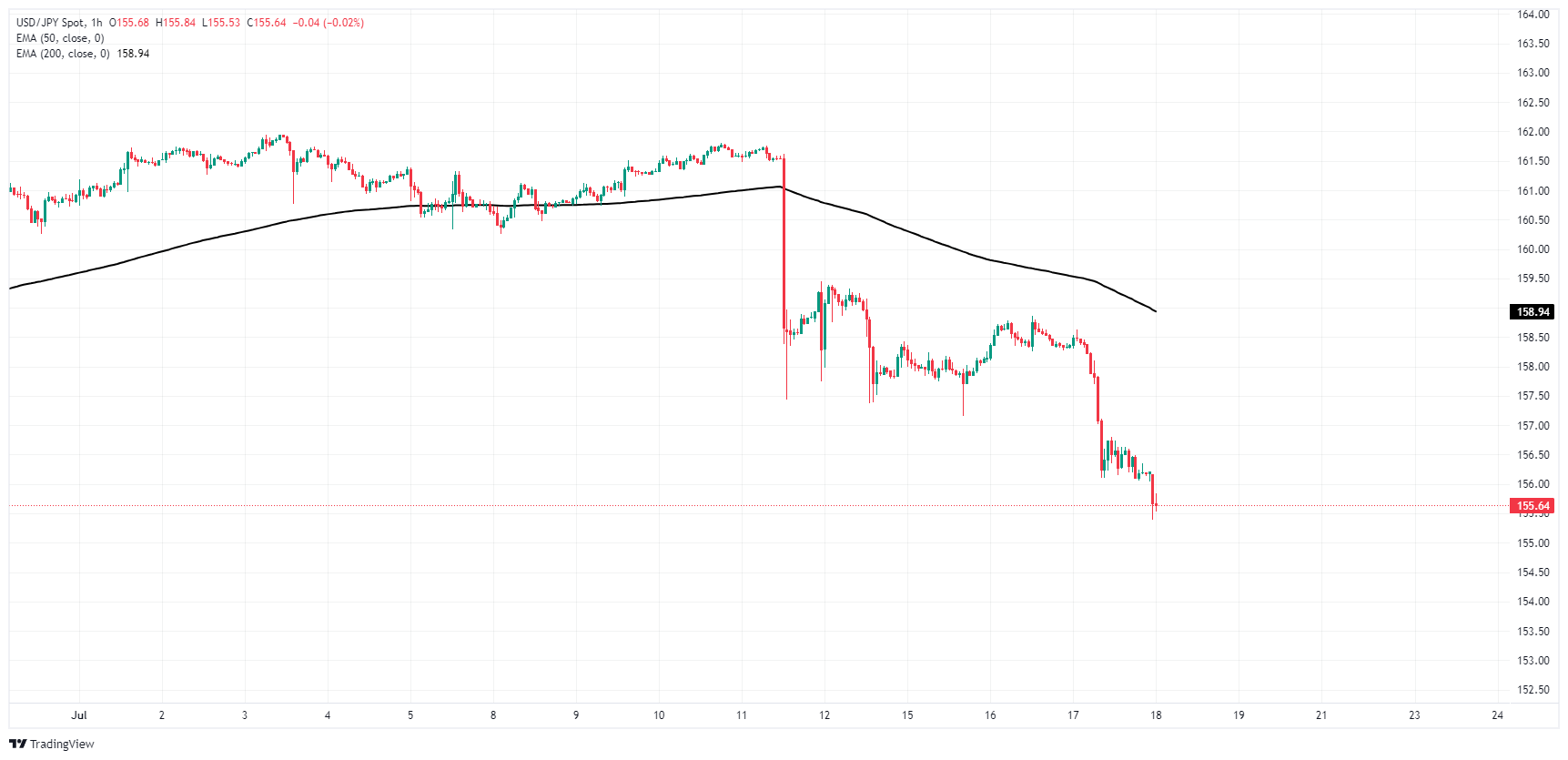Japan's Trade Balance for the year ended in June surged to nearly a quarter of a trillion Yen surplus of ¥224B after a steeper-than-expected decline in Imports washed out a slightly-better decline in Export figures.
Japan's YoY Exports in June grew by 5.4%, below the forecast 6.4% and a steeper decline from the previous period's 13.5% upsurge. Despite the decline in Exports growth, Imports growth collapsed back to 3.2%, well below the forecast 9.3% compared to the previous 9.5%.
Looking further into the data, Japan's Exports to the EU declined sharply, falling -13.4% which failed to get offset by an 11.0% YoY increase in Exports to the US.
Market reaction
USD/JPY is testing lower in the early Thursday Pacific market session, testing down into 155.50 as the Yen sees a brief resurgence in strength after months of declines.
USD/JPY hourly chart
Japanese Yen FAQs
The Japanese Yen (JPY) is one of the world’s most traded currencies. Its value is broadly determined by the performance of the Japanese economy, but more specifically by the Bank of Japan’s policy, the differential between Japanese and US bond yields, or risk sentiment among traders, among other factors.
One of the Bank of Japan’s mandates is currency control, so its moves are key for the Yen. The BoJ has directly intervened in currency markets sometimes, generally to lower the value of the Yen, although it refrains from doing it often due to political concerns of its main trading partners. The current BoJ ultra-loose monetary policy, based on massive stimulus to the economy, has caused the Yen to depreciate against its main currency peers. This process has exacerbated more recently due to an increasing policy divergence between the Bank of Japan and other main central banks, which have opted to increase interest rates sharply to fight decades-high levels of inflation.
The BoJ’s stance of sticking to ultra-loose monetary policy has led to a widening policy divergence with other central banks, particularly with the US Federal Reserve. This supports a widening of the differential between the 10-year US and Japanese bonds, which favors the US Dollar against the Japanese Yen.
The Japanese Yen is often seen as a safe-haven investment. This means that in times of market stress, investors are more likely to put their money in the Japanese currency due to its supposed reliability and stability. Turbulent times are likely to strengthen the Yen’s value against other currencies seen as more risky to invest in.
Information on these pages contains forward-looking statements that involve risks and uncertainties. Markets and instruments profiled on this page are for informational purposes only and should not in any way come across as a recommendation to buy or sell in these assets. You should do your own thorough research before making any investment decisions. FXStreet does not in any way guarantee that this information is free from mistakes, errors, or material misstatements. It also does not guarantee that this information is of a timely nature. Investing in Open Markets involves a great deal of risk, including the loss of all or a portion of your investment, as well as emotional distress. All risks, losses and costs associated with investing, including total loss of principal, are your responsibility. The views and opinions expressed in this article are those of the authors and do not necessarily reflect the official policy or position of FXStreet nor its advertisers. The author will not be held responsible for information that is found at the end of links posted on this page.
If not otherwise explicitly mentioned in the body of the article, at the time of writing, the author has no position in any stock mentioned in this article and no business relationship with any company mentioned. The author has not received compensation for writing this article, other than from FXStreet.
FXStreet and the author do not provide personalized recommendations. The author makes no representations as to the accuracy, completeness, or suitability of this information. FXStreet and the author will not be liable for any errors, omissions or any losses, injuries or damages arising from this information and its display or use. Errors and omissions excepted.
The author and FXStreet are not registered investment advisors and nothing in this article is intended to be investment advice.
Recommended content
Editors’ Picks
AUD/USD jumps toward 0.6750 after mostly upbeat Aussie jobs data

AUD/USD is picking up fresh toward 0.6750 in Asian trading on Thursday, The pair draws support from mostly upbeat Australian employment data for June, which fan RAB rate hike bets. Meanwhile, the US Dollar remains depressed amid Fed rate cut bets, capping the pair's downside.
USD/JPY retakes 156.00 after suspected BoJ intervention-led drop

USD/JPY is back above 156.00, having witnessed a sharp drop amid thin liquidity in the early Asian hours on Thursday. The pair finds support from a modest uptick in the US Dollar alongside the US Treasury bond yields, reversing the suspected BoJ intervention-led sell-off.
Gold price stays supported at $2,450 amid risk aversion, Fed easing bets

Gold price sees some fresh buying interest above $2,450 in the Asian session on Thursday, stalling a retracement from a fresh record high. Gold price cheers broad risk aversion and heightened Fed easing expectations ahead of mid-tier US data and more Fedspeak.
Ethereum ETF issuers file updated drafts, ETH staking still a possibility

Ethereum is down 1% on Wednesday as issuers began filing their final spot ETH ETF S-1 drafts with the SEC in anticipation of a launch on July 23. Meanwhile, SEC commissioner Hester Peirce also said the regulator may reconsider its position on ETH staking within the ETFs.
ECB preview: Incoming data since June unlikely to shift the policy view

Since the last ECB meeting five weeks ago in June, only a limited amount of new economic data has become available, and this data is unlikely to have significantly changed the ECB's perspective on the economy and consequently its policy stance.